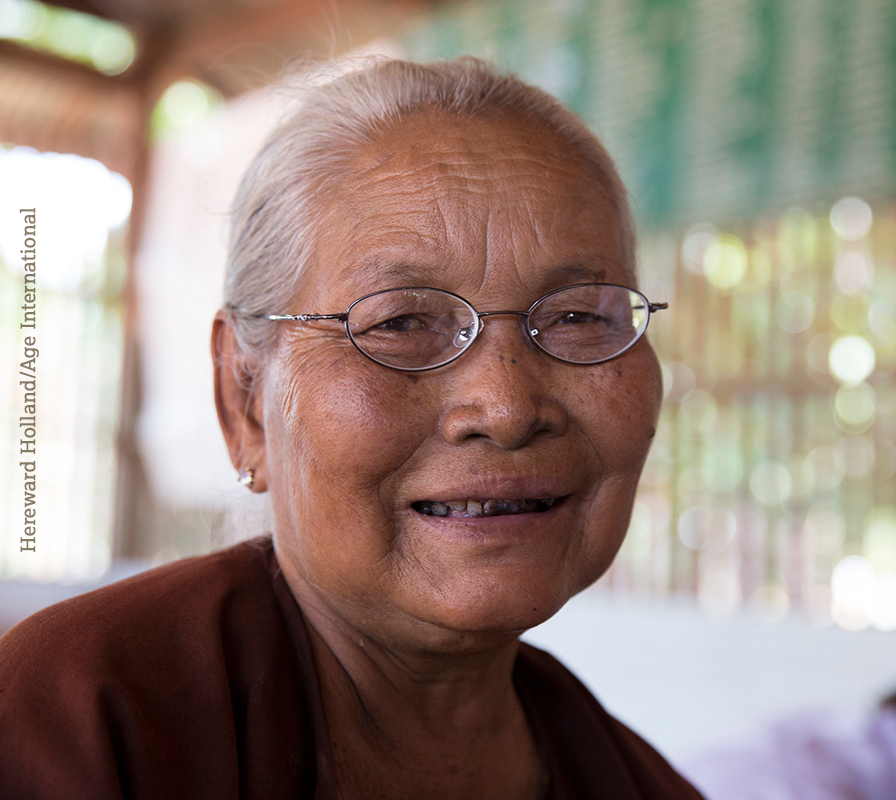Government policies on ageing
1. National approaches
Many countries have a national approach to improving the lives of older people in their country. In Indonesia, a National Plan of Action on Ageing is renewed every 5 years, while in Cambodia the National Policy for the Elderly was launched in 2003 as a direct response to the Madrid International Plan of Action on Ageing. This plan highlights the responsibility of the Cambodian Government to support older people via social, health and economic sectors.[i]
Vietnam has expanded its budget for older people’s activities and developed plans and legislation to promote and protect older people’s rights, for instance the 2010 Law on the Elderly. Population ageing has also been included as one of the prioritised issues in the new national strategy on population and reproductive health for 2011-2020.[ii]
The Philippines Plan of Action for Senior Citizens (2011-2016) encourages community-based approaches with effective leadership and meaningful participation of senior citizens in decision-making processes. It emphasises preventative health for active ageing, and seeks to ensure health services are accessible, affordable and available at all times.
More information on specific countries can be found via the countries page.
2. Social pensions
Old age brings a reduced capacity for work and increases the likelihood of poverty. Social security benefits are the main policy instrument to prevent poverty and reduce income disparities. Despite this, older people in different countries have access to different levels of social protection.
For example in Cambodia, there is no state pension provision except for retired civil servants and war veterans.
In Vietnam, people over 60 can receive social assistance of $6 USD per month, provided they meet the means test, while those over the age of 80 may be eligible to receive $9USD (pensions-tested).
Thailand introduced a tiered benefit Old Age Allowance in 2011 where different age groups receive different amounts: those aged between 60 and 69 years receive $19 USD a month, those between 70 and 79 receive $22 USD, those between 80 and 89 receive $26 USD and over 90s receive $32 USD per month.
In the Philippines, the government provides a social pension of $12 USD per month to poor older persons aged 77 and over who are not yet receiving any government or private pension. In early 2013, the government doubled the budget for social pensions for 2014, and is in the process of expanding the social pension to those under 77 years of age.
3. Health and care
The overwhelming burden of disease in older people is from non-communicable diseases. These include the biggest killers: heart disease, stroke and chronic lunch disease, while the main causes of disability are visual and hearing impairment, dementia and osteoarthritis.
In Cambodia, the National Policy for Elderly makes provision for the technical training of health staff on the care of older people. It also makes provisions to develop comprehensive mental health-care services for older people.[iii]
In the Philippines the Government has issued Guidelines on the Home Care Support Services for Senior Citizens, establishing community based health care services for older persons. Older people in poverty also benefit from services such as free medical services in government hospitals, discounted services on private hospitals and clinics, free vaccines, discounted medicines, and mandatory PhilHealth coverage.
Japan has the highest proportion of older adults globally. Recognising this challenge, the government has passed a number of laws and policies to address ageing. For instance, to deal with rising long term care costs, they have incorporated disability prevention services into long term care benefits and are exploring ways to promote independent living.
There is more detailed information available on both health and care.
[i] Kingdom of Cambodia Country Paper, http://www.mhlw.go.jp/bunya/kokusaigyomu/asean/asean/kokusai/siryou/dl/h16_cambodia2.pdf, p.3 (28 May 2013)
[ii] Population Ageing in Viet Nam: Challenges for the Country’s Socio-Economic Development
http://vietnam.unfpa.org/public/cache/offonce/pid/7882;jsessionid=CFDA77BA26B57E4F9688AA748BCED506.jahia01 accessed 6 July 2013
[iii] United Nations Population Fund and HelpAge International, Overview of available policies and legislation, data and research, and institutional arrangements relating to older persons – progress since Madrid, New York, United Nations Population Fund, 2011, p.48 and p.50
[1] Kingdom of Cambodia Country Paper, http://www.mhlw.go.jp/bunya/kokusaigyomu/asean/asean/kokusai/siryou/dl/h16_cambodia2.pdf, p.3 (28 May 2013)
[1] Population Ageing in Viet Nam: Challenges for the Country’s Socio-Economic Development
http://vietnam.unfpa.org/public/cache/offonce/pid/7882;jsessionid=CFDA77BA26B57E4F9688AA748BCED506.jahia01 accessed 6 July 2013
[1] United Nations Population Fund and HelpAge International, Overview of available policies and legislation, data and research, and institutional arrangements relating to older persons – progress since Madrid, New York, United Nations Population Fund, 2011, p.48 and p.50

